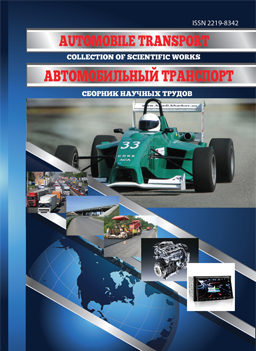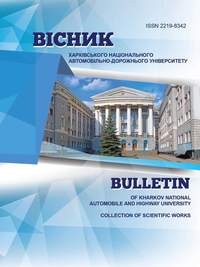Expert systems for monitoring the technical condition of the vehicle
DOI:
https://doi.org/10.30977/VEIT.2018.14.0.56Abstract
Problem. In order to achieve the high quality of the solution of problems, it is necessary to improve the system of technical maintenance of cars taking into account the development of computer and intellectual technologies of the present. The use of expert systems develops gradually over the entire time of the existence of the systems being studied, and therefore the evolutionary approach to their creation within the service of cars should be dominant in theoretical studies and special developments. Methodology. The theoretical and methodological basis of the research is made up of the fundamental principles of modern computer technology, service technology, scientific works of foreign and domestic scientists in the field of expert systems and information technology in the organization of technical maintenance. Goal. The goal of the study of this work is to consider the introduction of an expert system for monitoring the technical condition and diagnostics of vehicles. Results. The article considers an estimation of the possibility of using an expert system in the maintenance and diagnosis of vehicles at a service station. Originality. A detailed review of the expert system (ES classification, stages of creation and their algorithmization) as a way of obtaining, analyzing and processing diagnostic information has made it possible to determine that the expert system is the optimal way of processing and storing information that can subsequently be used as needed by a person or a machine. to meet the needs of diagnosing and servicing automobiles. Practical value. The results of the conducted research allow us to conclude that it is possible to solve an important scientific and practical task of increasing the level of monitoring and servicing vehicles using expert systems. The formalization of the technology of expert systems, the development in its framework of mathematical methods and algorithms for the formation and processing of knowledge - this is the direction for implementation when servicing cars.
Key words:
operation; maintenance; diagnostics; expert system; knowledge base; vehicle.
References
Govoruschenko N.Ya., Turenko A.N. (1998). Sistemotehnika transporta (na primere avtomobilnogo transporta) [Systems engineering of transport (for example, road transport)]. Kharkiv: HGADTU. [in Russian].
Denton T. (2008). Avtomobilnaya elektronika [Car electronics]. Moskov: NT Press. [in Russian].
Intellektualnyie transportnyie sistemyi [Intelligent transport systems]. Retrived from: http://m2m-t.ru/solutions/its/ (accessed: 15.10.2018) [in Russian].
Oschepkova E. A. (2012). Informatsionnyie tehnologii na avtomobilnom transporte [Information technology in road transport]. Kemerovo: KuZGTU. [in Russian].
Volkov Yu.V. (2015). Retrospektivnyiy analiz i perspektivyi razvitiya tehnicheskoy ekspluatatsii avtomobiley. Kharkiv: Vestnik KhNADU, 71, 30 – 35. [in Russian].
Volkov V.P., Mateichik V.P., Komov P.B., Gritsuk I.V., Smeshk M., Volkova T.V., Tsyuman M.P. (2015). Intelektualni sistemi monitoringu transportu [Intelligent transport monitoring systems]. Kharkiv: NTMT. [in Ukrainian].
Volkov V.P., Mateychik V.P., Gritsuk I.V., Marmut I.A., Volkova T.V., Volodarets M.V. (2017). Monitoring tehnichnogo stanu avtomobilya v zhittevomu tsikli [Monitoring of technical condition of an auto-car in the life cycle]. Kharkiv: KhNADU. [in Ukrainian].
Gritsunov O.V. (2010). Informatsiyni sistemi ta tehnologii [Information systems and technologies]. Kharkiv: HNAMG. [in Ukrainian].
Dzhekson P. (2001). Vvedenie v ekspertnyie sistemyi [Introduction to expert systems]/ SPb: Vilyams. [in Russian].
Chastikov A.P. and Gavrilova T.A. and Belov D.L. (2003). Razrabotka ekspertnyih sistem. Sreda CLIPS [Development of expert systems. SLIPS development environment]. SPb: BHV. [in Russian].
Neylor K. (1991). Kak postroit svoyu ekspertnuyu sistemu [How to build your expert system] Moskov, Energoatomizdat. [in Russian].
Vvedeniya v ekspertnyie sistemyi [Introduction to expert systems]. Retrived from: http://www.habarov.spb.ru/new_es/exp_sys /es01/es1.htm (accessed: 23.10.2018) [in Russian].
Klassifikatsiya ekspertnyih sistem [Classification of expert systems]. Retrived from: http://expertsistem.ucoz.ru/index/klassifikacija_ehkspertnykh_si-stem/0-21(accessed: 23.10.2018) [in Russian].
Muromtsev D.I. (2005). Vvedenie v tehnologii ekspertnyih sistem [Introduction to expert systems technology]. SPb: ITMO. [in Russian].
ПРИСТАТЕЙНА БІБЛІОГРАФІЯ ДСТУ
Говорущенко Н. Я., Туренко А. Н. Системо-техника транспорта (на примере автомоби-льного транспорта). РИО ХГАДТУ. 1998. 468 с.
Дентон Т. Автомобильная электроника. NT Press. 2008. 576 c.
Интеллектуальные транспортные системы. 2018. URL: http://m2m-t.ru/solutions/its/ (дата звернення: 15.10.2018).
Ощепкова Е. А. Информационные техноло-гии на автомобильном транспорте. КуЗГТУ. 2012. 144 с.
Волков Ю. В. Ретроспективный анализ и пе-рспективы развития технической эксплуата-ции автомобилей. Вестник ХНАДУ. 2015. №71. С. 30–35.
Волков В. П., Матейчик В. П., Комов П. Б., Грицук І. В., Смешек М., Волкова Т. В., Цю-ман М. П. Інтелектуальні системи моніторі-нгу транспорту. Вид-во НТМТ. 2015. 246 с.
Волков В. П., Матейчик В. П., Грицук І. В., Мармут І. А., Волкова Т. В., Володарець М.В. Моніторинг технічного стану автомобіля в життєвому циклі: підручник. ХНАДУ. 2017. 309 с.
Грицунов О. В. Інформаційні системи та тех-нології. Харків: ХНАМГ. 2010. 222 с.
Джексон П. Введение в экспертные системы. Вильямс. 2001. 624 с.
Частиков А. П., Гаврилова Т. А., Белов Д. Л. Разработка экспертных систем. Среда СLIPS. БХВ- Петербург. 2003. 396 с.
Нейлор К. Как построить свою экспертную систему. Энергоатомиздат. 1991. 286 с.
Введения в экспертные системы 2018. URL: http://www.habarov.spb.ru/new_es/ exp_sys/es01/es1.htm (дата звернення: 23.10.2018).
Классификация экспертных систем 2018. URL: http://expertsistem.ucoz.ru/index/klas-sifikacija_ehkspertnykh_si-stem/0-21 (дата звернення: 23.10.2018).
Муромцев Д. И. Введение в технологии экспертных систем. ИТМО. 2005. 107 с.
Downloads
Published
How to Cite
Issue
Section
License
Copyright (c) 2021 В’ячеслав Миколайович Павленко

This work is licensed under a Creative Commons Attribution 4.0 International License.
Автори, які публікуються у цьому журналі, погоджуються з наступними умовами:
1. Автори залишають за собою право на авторство своєї роботи та передають журналу право першої публікації цієї роботи на умовах ліцензії Creative Commons Attribution License, котра дозволяє іншим особам вільно розповсюджувати опубліковану роботу з обов'язковим посиланням на авторів оригінальної роботи та першу публікацію роботи у цьому журналі.
2. Автори мають право укладати самостійні додаткові угоди щодо неексклюзивного розповсюдження роботи у тому вигляді, в якому вона була опублікована цим журналом (наприклад, розміщувати роботу в електронному сховищі установи або публікувати у складі монографії), за умови збереження посилання на першу публікацію роботи у цьому журналі.
3. Політика журналу дозволяє і заохочує розміщення авторами в мережі Інтернет (наприклад, у сховищах установ або на особистих веб-сайтах) рукопису роботи, як до подання цього рукопису до редакції, так і під час його редакційного опрацювання, оскільки це сприяє виникненню продуктивної наукової дискусії та позитивно позначається на оперативності та динаміці цитування опублікованої роботи.








